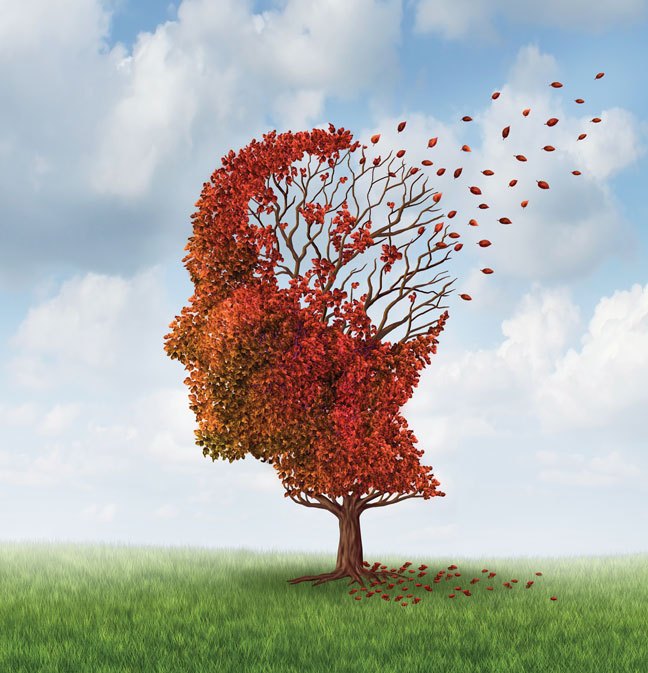In a moment of lucidity, my mom quietly and calmly spoke. “I love you, too,” she said as the ambulance service took her from the home she shared with my dad, her husband of 58 years, to long-term care in a nursing home. It is only 10 kilometres away, but the journey to get her there took seven years. My mom, Betty, is 74, and she lives with early onset Alzheimer's disease.
When my parents visited us in Winnipeg from their home in Ontario, we began to notice changes in Mom. She forgot simple tasks and left ingredients out of recipes she had cooked so often. At the time, she laughed it off. We knew something was wrong, but we accepted her explanations of her behaviour as reasonable because we were ignoring—denying—what we all feared.
As the years passed, her memory began to disappear and she stopped cooking completely. We now know our initial fears were warranted and we have watched as she has gradually lost her independence and her personality has slipped away.
Living on Memory Lane
A therapist explained Alzheimer's to me in an interesting way. When a snowball is rolled around a yard, it becomes bigger as more snow is added, in much the same way as our experiences help us to grow and develop. When that snowball begins to melt and the outer layers disappear, the original ball remains. That perfectly describes my mom's experience with Alzheimer's. As the disease progressed and more and more of her personality melted away, she preferred the predictability of her home, the familiar voices and singing of her grandchildren, and was particularly happy when her friends came by for their regular Monday night UNO games. She became increasingly frustrated with family and public gatherings, where the environment was filled with lots of faces and people asking questions in the normal course of conversation.
A college friend dropped me a note on Facebook when he heard about my mom. “Don't forget to love her and keep her engaged in your family. She's still your mother.” It is easy to forget that when the person you love seems to be slowly drifting away, but we try to find ways to keep Mom connected to us. So a year ago, I sat with her at a concert where my daughter was performing with her choir. At that point, Mom was not able to put sentences together to communicate, or if she did, they related to times past. But after the choir finished singing, she said, “That was the most beautiful song I have ever heard.” In that moment, she was fully present and spoke one of the most beautiful sentences I have heard. We also find that looking at old photos, playing familiar music, talking about people from the past and engaging in conversation—as mixed up as it can be—is helpful in keeping my mom's mind as active as possible and her connected to the people who love her.
Caring for the Caregivers
It is the love my dad has for my mom that caused him to take on the role of caregiver and make promises that would be impossible to keep. My parents had cared for my maternal grandmother in their home as she struggled with Alzheimer's, and had found it extremely difficult to place her in long-term care when the time came. My grandmother did not transition well and often begged to come home, so the thought of my mom in a similar situation prompted my dad to promise, “I won't put you in a nursing home.”
As the primary caregiver, Dad's world became smaller as my mom's condition progressed and her life was lived in 10-minute increments, replayed over and over. His life shrank to include only church, seniors' group, their apartment, and the task of organizing care workers, doctors, social workers and physical therapists. When taking her to church became too difficult and even driving a short distance to visit family was a chore, Alzheimer's made prisoners of both my parents.
Support systems for personal and long-term care for dementia patients are often maxed out, with waiting times for some nursing homes being as long as four years. Personal support care programs may not fully meet the needs required to keep a loved one at home, and too often the caregivers end up in personal crises before respite and care are available. From the first days of your journey with Alzheimer's, talk openly and honestly about in-home practical supports and long-term care options. Tend to legal matters with powers of attorney for finance and care before the person with Alzheimer's is no longer able to speak on their own behalf.
Advocacy became a part of my weekly routine as I fought to get my mom the care she needed. She had become increasingly belligerent to her personal support workers so I was meeting with a crisis care worker to discuss our options. I remember laughing during our conversation, prompting her to ask, “What's so funny?”
“It's ironic,” I replied. “If you had ever needed someone to go to bat for one of your patients in the past, you would have had my mom on speed dial. In health she was a tenacious advocate that would never take no for an answer. I'm speaking with her voice and I refuse to take no for an answer.” Curly hair, it turns out, isn't the only thing I inherited from my mom.
As the number of people with Alzheimer's and dementia grows, so does the need for increased ministry to support families living with the realities of the disease. My dad's corps officers at Burlington Community Church, Ont., are wonderful pastors who provide spiritual care to my parents, particularly my dad, through their visits, prayer and practical support. It takes a community of support to buoy a family as they deal with Alzheimer's disease, and I believe the faith community has a tremendous opportunity to minister to them.
My family's journey has been filled with frustration, exhaustion and heartache, tempered by love, care, support and prayer. Now when we sit with my mom in her new home, sometimes my dad and I will look at each other, shake our heads, and laugh to avoid crying as we look back on the weeks and months that brought us to this place. And when we laugh, my mom often turns her head, purses her lips and lets out a raspberry to remind us she is still here—wife, mother, grandma and friend.
Captain Rick Zelinsky is the executive director of Ontario Camping Ministries.
When my parents visited us in Winnipeg from their home in Ontario, we began to notice changes in Mom. She forgot simple tasks and left ingredients out of recipes she had cooked so often. At the time, she laughed it off. We knew something was wrong, but we accepted her explanations of her behaviour as reasonable because we were ignoring—denying—what we all feared.
As the years passed, her memory began to disappear and she stopped cooking completely. We now know our initial fears were warranted and we have watched as she has gradually lost her independence and her personality has slipped away.
Living on Memory Lane
A therapist explained Alzheimer's to me in an interesting way. When a snowball is rolled around a yard, it becomes bigger as more snow is added, in much the same way as our experiences help us to grow and develop. When that snowball begins to melt and the outer layers disappear, the original ball remains. That perfectly describes my mom's experience with Alzheimer's. As the disease progressed and more and more of her personality melted away, she preferred the predictability of her home, the familiar voices and singing of her grandchildren, and was particularly happy when her friends came by for their regular Monday night UNO games. She became increasingly frustrated with family and public gatherings, where the environment was filled with lots of faces and people asking questions in the normal course of conversation.
A college friend dropped me a note on Facebook when he heard about my mom. “Don't forget to love her and keep her engaged in your family. She's still your mother.” It is easy to forget that when the person you love seems to be slowly drifting away, but we try to find ways to keep Mom connected to us. So a year ago, I sat with her at a concert where my daughter was performing with her choir. At that point, Mom was not able to put sentences together to communicate, or if she did, they related to times past. But after the choir finished singing, she said, “That was the most beautiful song I have ever heard.” In that moment, she was fully present and spoke one of the most beautiful sentences I have heard. We also find that looking at old photos, playing familiar music, talking about people from the past and engaging in conversation—as mixed up as it can be—is helpful in keeping my mom's mind as active as possible and her connected to the people who love her.
Caring for the Caregivers
It is the love my dad has for my mom that caused him to take on the role of caregiver and make promises that would be impossible to keep. My parents had cared for my maternal grandmother in their home as she struggled with Alzheimer's, and had found it extremely difficult to place her in long-term care when the time came. My grandmother did not transition well and often begged to come home, so the thought of my mom in a similar situation prompted my dad to promise, “I won't put you in a nursing home.”
As the primary caregiver, Dad's world became smaller as my mom's condition progressed and her life was lived in 10-minute increments, replayed over and over. His life shrank to include only church, seniors' group, their apartment, and the task of organizing care workers, doctors, social workers and physical therapists. When taking her to church became too difficult and even driving a short distance to visit family was a chore, Alzheimer's made prisoners of both my parents.
It takes a community of support to buoy a family as they deal with Alzheimer's
Support systems for personal and long-term care for dementia patients are often maxed out, with waiting times for some nursing homes being as long as four years. Personal support care programs may not fully meet the needs required to keep a loved one at home, and too often the caregivers end up in personal crises before respite and care are available. From the first days of your journey with Alzheimer's, talk openly and honestly about in-home practical supports and long-term care options. Tend to legal matters with powers of attorney for finance and care before the person with Alzheimer's is no longer able to speak on their own behalf.
Advocacy became a part of my weekly routine as I fought to get my mom the care she needed. She had become increasingly belligerent to her personal support workers so I was meeting with a crisis care worker to discuss our options. I remember laughing during our conversation, prompting her to ask, “What's so funny?”
“It's ironic,” I replied. “If you had ever needed someone to go to bat for one of your patients in the past, you would have had my mom on speed dial. In health she was a tenacious advocate that would never take no for an answer. I'm speaking with her voice and I refuse to take no for an answer.” Curly hair, it turns out, isn't the only thing I inherited from my mom.
As the number of people with Alzheimer's and dementia grows, so does the need for increased ministry to support families living with the realities of the disease. My dad's corps officers at Burlington Community Church, Ont., are wonderful pastors who provide spiritual care to my parents, particularly my dad, through their visits, prayer and practical support. It takes a community of support to buoy a family as they deal with Alzheimer's disease, and I believe the faith community has a tremendous opportunity to minister to them.
My family's journey has been filled with frustration, exhaustion and heartache, tempered by love, care, support and prayer. Now when we sit with my mom in her new home, sometimes my dad and I will look at each other, shake our heads, and laugh to avoid crying as we look back on the weeks and months that brought us to this place. And when we laugh, my mom often turns her head, purses her lips and lets out a raspberry to remind us she is still here—wife, mother, grandma and friend.
Captain Rick Zelinsky is the executive director of Ontario Camping Ministries.










Blessings.